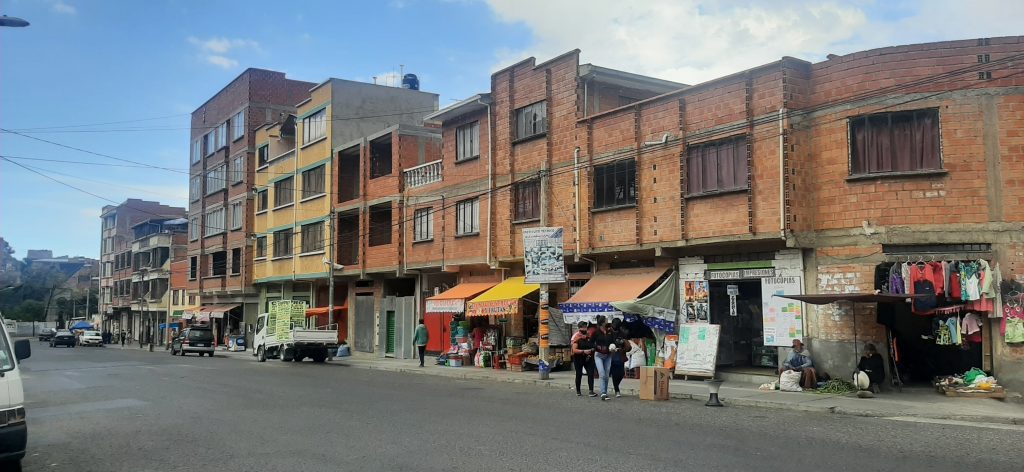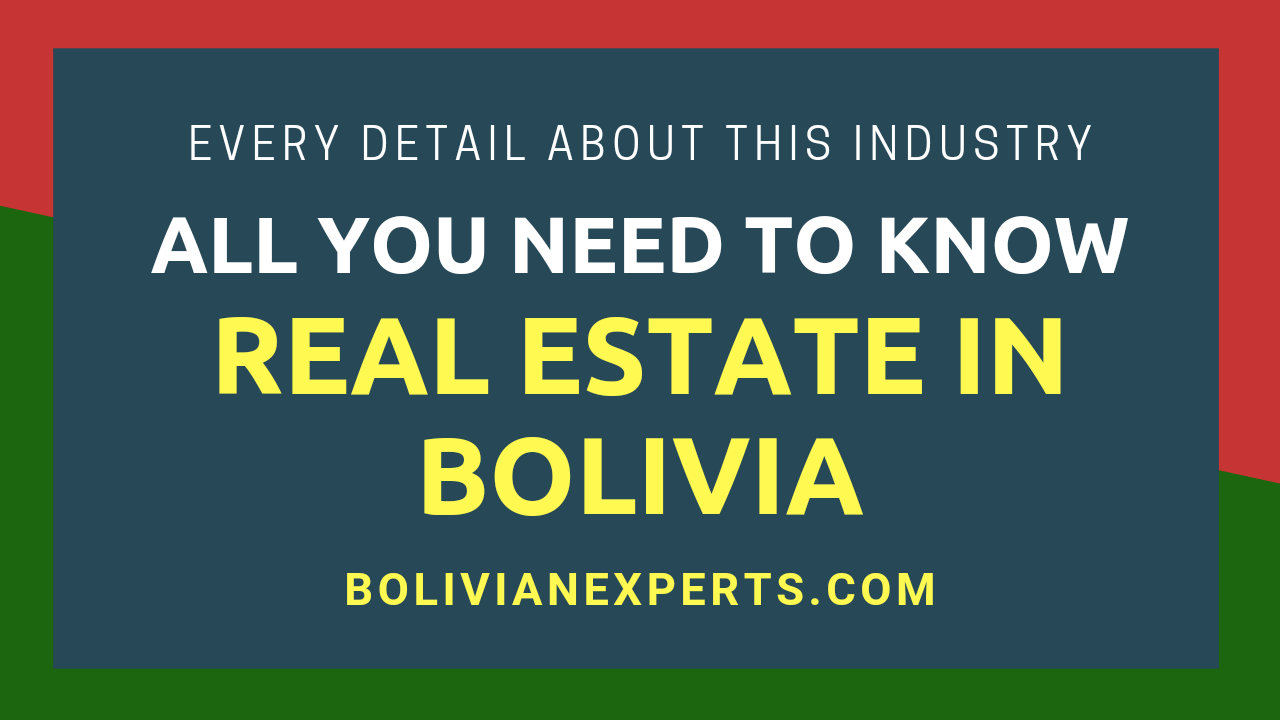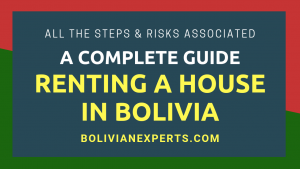If you want to know more about how the real estate industry works in Bolivia, you are in the right place. We are real estate Bolivian experts who have lived all our lives in this country (you can see our Bolivian real estate website), so we know all the hidden deals, risks, and activities of this field here. Said that now we are going to deeply show you every detail about this field in our country.
The real estate field in Bolivia works mostly in the same way as in first-tier countries, with similar commercial, legal, tax, and technical regulations and systems. What is different is the high level of risk during property buying and renting processes and also the better return on the investment.
In the following lines, you’ll be learning all the specific details and numbers that surround every aspect of real estate in Bolivia, including the environment variables, real estate market behaviors, and tendencies that may impact your future decisions about whether it’s worth or not to have real estate activities or invest in this field in our country.
Looking at Bolivian real estate on all its sides:
Real estate in Bolivia, like in any other country, is a complex field that has many different sides which work together to bring this industry to life.
The most important components or sides of real estate in Bolivia are:
- The commercial side
- The legal side
- The financial side
- The technical side
- The investing side
- The administrative side
- The precautions’ side
In the following sections, we’ll show you the details of all these sides or components that the real estate field has in Bolivia. Also, the strengths and weaknesses of each one.
1) The commercial side of real estate in Bolivia
The real estate market in the country is on an ongoing significant development. For example, major companies like ReMax and Century 21 have already entered the country, which combined, have now around 50 offices spread across the country, located in 7 of the 10 major cities. At this time, both companies have here an average of 3,000 real estate listings at any given moment.
There are also nearly 2,500 informal realtors and several thousands of independent real estate agents working part-time or full-time, but most of them are informal businesses and workers, which don’t have the proper licensing to operate legally. These informal companies and agents import a lot of risk to clients and many scammers hide behind them.
Despite this, you need to know that the real estate market in Bolivia is very profitable, and this is because of the following reasons:
- Urban properties increase in sale price at an average rate of 1.5 in 5 years. This is because a lot of people from rural areas are moving to urban areas, and many people are moving to Santa Cruz or El Alto cities, also the population of Bolivia is increasing at a high rate, and even more, the GDP of Bolivia is also increasing at the rate of 3% to 5% each year. Then, if you buy a $100,000 property now in Bolivia, you would expect it to have a sale price of $150,000 in 5 years. This rate goes from 1.3x to 1.7x, depending on different factors, like the city, the location of the property, the type of property, etcetera.
- The real estate market in Bolivia is very stable. Here in Bolivia, you won’t see significant drops or ups in house sale prices, this is because the market is not very dynamic as in other countries, for example in The United States, where the properties can appreciate up to 2x or more in a couple of years. In Bolivia, it’s normal to see drops and ups of 20% to 30% in house sale prices. But in general, the baseline price only increases all the time because of the reasons we’ve described in the first bullet.
- The real estate market in Bolivia has a lot of opportunities. Here in Bolivia, there are no MLS listings or something similar, and there is a lot of asymmetric information in the market. Many people normally undervalue or overvalue their properties too much, and also most of them here are FSBO sellers and buyers, they also in general don’t trust realtor companies. This situation creates many opportunities for people that know a lot about how to find the best deals in real estate to easily grasp great offers after just seeing a few tens of properties or even less.
These reasons, among others more specific, are the reason why, at the end of the day, investing in real estate in Bolivia is highly profitable. Also, it’s relatively easy to manage this investment, as you pay little taxes, and most of the time the tenant is responsible to take care of the house, the basic services, etcetera.
2) The legal side of real estate in Bolivia
Contrary to what most people from overseas think, real estate in Bolivia can be very secure if you know how to bring this safety into your investment. This is because it’s very hard and costly for Bolivians to conduct legal processes and lawsuits to try to get (or steal) a house this way. These legal processes can last for even a decade and cost thousands of dollars, in addition to a lot of time, stress, and resources.
This is why Bolivian people try to avoid at all costs legal conflicts in real estate. So in general, house owners don’t normally face lawsuits or legal conflicts, these kinds of complex legal issues occur in inheritance cases and inside Bolivian families, nevertheless, some lawyers may conduct these processes to unethically get the ownership of houses.
The real estate public institutions and laws do a good job when protecting the rights of house owners. But another story is with a lot of lawyers. Many lawyers in Bolivia will try to deceive or even scam people and take advantage of their clients and take their homes, this is a sad reality in our country.
This is why you need to be very careful when hiring a lawyer or getting legal assistance here in Bolivia. You must get the best possible professional and ethical one available, otherwise, you can face the loss of your house and tens of thousands of dollars, also a lot of stress and time lost.
All of this results in a unique legal phenom that emerges in real estate here in Bolivia:
- It’s significantly risky to buy or rent properties in the country.
- But it is pretty secure to own a property in Bolivia.
Why is it significantly risky to buy or rent properties here?
This is because, as we said, situations like many unethical people, sellers who want to scam buyers, lawyers with bad intentions, corruption, bureaucracy, institutions making mistakes on registrations, the presence of squatters, the absence of something like Title Insurance, etcetera are present in the buying process of a house in Bolivia.
Also, some tenants will try to get the house by illegal means or by badly written rental contracts, among other many reasons. This also provokes a high risk in the renting phase of real estate activities in the country.
Why is it quite secure to own a property in Bolivia?
It’s again as we said, because once the house has all its paperwork well done and completed, and the house sale process has been finished in a good way, Bolivian laws and institutions, particularly the institution called “Derechos Reales” do a decent job in protecting property owners in Bolivia.

Additionally, people try to avoid legal conflicts at all costs when the paperwork is clean and completed, because their odds to win a legal conflict are pretty low, and the costs and time to spend are very high. Also, when you rent your house, if you have done a public deed for the rental, the tenant can’t try to squatter your house or take it.
3) The financial side of real estate in Bolivia
You’ll find that almost the same variables that affect the financial side of real estate in other countries also are present in Bolivia. You need to evaluate the expenses and costs in the house purchase process, construction, taxes, renting, maintenance, basic services, home loan, realtor fees, public notary fees, etcetera, as we show below.
The following are the most important numbers that real estate has in Bolivia:
- An appreciation to 5 years in the future from 1.3x to 1.7x, with an average of 1.5x.
- An annual rental gross income of 4% to 8%, also an annual rental net income of 3.5% to 7%.
- Houses’ sale price ranges between $4,000 to $3 million, for buildings and high-rises it ranges from $0.5 million to $50 million.
- A house sale tax of 3% of the price agreed for the sale, paid during the property sale process.
- The average construction cost is $25 per ft2, which generally ranges from $21 to $35. Luxury constructions can have a cost of $50 to $100 per ft2.
- A house ownership tax that ranges from 0.01% to 0.1% of the house’s market value, paid annually.
- A house rental tax that is around 16% of the monthly rental income, paid every month.
- The monthly cost of basic services for a $100,000 house located in an average neighborhood is around $50.
- The average home rental vacancy rate in Bolivia is around 1 month per year.
- Realtors and real estate agents get a commission from 2% to 4% of the sale price, charged to the vendor when the house is sold.
- Realtors and real estate agents get a commission of 50% to 100% of the rental monthly payment (paid only one time).
- Real estate managing companies charge around 10% of the rental income for their managing services.
- If a natural person is the owner of a house and he receives a rental income, this person needs to pay from 5% to 10% in income taxes every year. If it’s a business that owns the house, it will pay 25% of its annual net income, and the accounting of the house will be mixed with other income sources.
- Hiring lawyers who are specialists in real estate will cost between $50 to $200 for services like assisting in buying and renting processes.
- The public notary who will make and sign up the public deed for the house purchase or rental will charge between $50 and $100 for this service.
- The registration of the property for sale in Real Rights (Derechos Reales) under the name of the new owner will cost 0.5% of the agreed home sale price.
- To buy a house in Bolivia, you will need between 3.5% to 5% of the house sale price in cash to cover all the buying expenses, buying taxes, and purchasing paperwork.
- Banks of Bolivia will ask for at least 20% for a down payment, to give a loan for buying a house (it’s more difficult for foreigners to get a loan from a Bolivian bank, they need to prove income in Bolivia).
- Mortgage interest rates are between 8% and 13% (way higher than rates in the US). For example, if you buy a $100,000 house with a loan and a downpayment of 20%, you’ll have to pay each month from $600 to $800 to cover the loan.
We can get important takeaways from these numbers. For example, if you want to buy a house in Bolivia you’ll need around 4% of the agreed sale price to cover all the buying costs and expenses. This percentage includes everything even the expenses in legal assistance, the public notary, home sale taxes, promotion of the house, etcetera.
If you’ll have a tenant in Bolivia, then from the gross monthly income coming from the rental, after taking into account the vacancy rates, taxes, payment of repairing costs, or even basic services, you’ll get between 70% and 80% of this amount as net income.
You’ll pay really low taxes for being the owner of the house each year, from 0.1% to 0.01%. This means that if you own a $100,000 average house in an average neighborhood of Bolivia, you’ll pay around $50 each year in house ownership taxes.
Take into account all these numbers to see if buying or investing in real estate in Bolivia really makes sense.
4) The technical side of real estate in Bolivia
In Bolivia, you’ll find different types of houses, the majority of them will be badly designed homes with poor functionality, and they will have a lot less quality than a house from a developed country. But in the zones where wealthy Bolivian people live (and also many foreigners), you will find houses that are as good as the first world countries.
This bad quality in the majority of houses in Bolivia is because people here tend to make informal constructions, hiring just a bunch of workers to build the house, and not complying with the proper paperwork. The low Bolivian income (avg. $500/month) has also an impact on the poor construction quality.
Nevertheless, by hiring a Bolivian well-known construction company, the result will be a good enough quality in the construction, which will last for about 30 years without major renovations. The home will also have all the design features and functionality you may require to live fairly well. This company, most of the time, will charge about $30/ft2 for the construction and the house will meet most of the accepted building standards.
Another is the story when you only hire a bunch of masons and workers to build a house in Bolivia (like most Bolivians normally do). You’ll end up getting a low-quality house that will require many additional improvements to be decently functional.
Did you know why houses in Bolivia look so weird, and so orange, like in the picture below? This is because these homes have been built by only masons and workers, without any construction and legal company backing them.

People in Bolivia tend to build their properties this way because they want to save money (normally it’s 10% to 20% less expensive), but this is wrong and in the long term they face all the limitations that just a team of masons and workers with only empirical knowledge can bring to the house they build.
We encourage you to, in all cases, hire only a legal construction company to build a house in Bolivia. It’ll cost you a little more money, but you’ll get a well-constructed house with all the international standards met.
Finally, the country doesn’t suffer too much from earthquakes and other natural catastrophes, so real estate here is not prepared for these situations, but such precautions will be required only sometimes, as Bolivia is a calm place where natural disasters generally don’t happen.
5) The investing side of real estate in Bolivia
Investing in real estate in Bolivia has its own risks, nevertheless, it can be very profitable only if you know how to invest here. If you are capable to bypass all the risks that may be present (e.g. badly written sale or rental contracts, squatting, unethical lawyers, scammers selling houses they don’t own, overpriced homes, tenants wanting to steal the house, etcetera), you’ll find that actually it’s very profitable to invest in real estate in the country.
The key to this profitability is that the prices of real estate in Bolivia are only going up and this trend is not going to change soon. This is like this because of the following reasons:
- Bolivia is increasing in population very rapidly.
- Bolivia’s GDP is increasing at a rate of 3% to 5% each year.
- Many people from rural areas are moving to the main cities.
- People from all over the country are moving to El Alto and Santa Cruz cities.
All of the above circumstances are driving the fact that no matter how real estate prices fluctuate, in the end, the price of a house is almost always higher than before, with an appreciation rate of 5 years in the future of 1.3x to 1.7x. Then, investing here in Bolivia is quite profitable and not that risky from a financial point of view.
Another situation is that in Bolivia there are no highly developed solutions to clarify the information on the real estate market or reduce the asymmetric information between sellers and buyers, like MLS listings, Zillow, or huge real estate directories, which in other countries provide all the details and information about any property available for sale.
Furthermore, almost all Bolivian people are FSBO sellers (For Sale By Owner) and buyers, so they are used to doing market research, publicity, paperwork, and appraisal of the house by themselves. Some of them lack the proper tools to get the best offers for their properties for sale, and for this reason, you’ll be able to find a lot of hidden gems and great deals a lot easier.
We have a complete guide about how to invest in Bolivia, including in real estate, with the best strategies available today, in the following direction: How to invest in Bolivia? The most profitable ways.
6) The administrative side of real estate in Bolivia
In Bolivia, it’s also very easy to manage a real estate property once you own it. The only tasks you need to complete once in a while to manage your property are the following:
- You’ll need to pay your house ownership tax every year.
- You’ll need to pay your house rental income tax every month if you have tenants.
- You’ll need to get a tenant for your house, in Bolivia it’s a cultural thing that the tenant will be responsible for the maintenance of the house and also responsible for avoiding possible property squatting. Remember to always sign up for a public deed for the rental to avoid the possibility of your tenant getting ownership of your house.
- You’ll need to change the tenant every few years (every two to four years). Don’t wait until 5 years have passed to replace your tenant, or you’ll be at risk of usucaption.
- You’ll need to do major maintenance and reparations to keep the house fully functional for the tenant.
- And that’s all!
As you can see, it’s easy to manage a real estate property in Bolivia, like in most other countries. You’ll need to pay some taxes, change tenants every few years, make major repairs and maintenance, and sometimes pay the basic service bills, but more than this won’t be required.
You even can hire a property management company available in Bolivia, to do most of these tasks on your behalf. There are some professional businesses that will do a good job. They mostly will get a commission of ~10% of the rental income every month for their services.
7) The precautions side of real estate in Bolivia
This is the side of the real estate industry in Bolivia in which you have to put a lot of care. In our country scam rates in real estate are way higher than in other places, there are a lot of fake real estate agents and realtors, fake sellers, unethical lawyers, bad public employees, bureaucracy, corruption inefficient masons, squattings, and also many owners who will tend to charge you more, or even overvalue their properties when having foreigners that want to buy or rent.
This is why you must master this side of real estate in Bolivia. You really need to know how to prevent all these troubles and how to react when they appear. The good news is that once you know how to overcome all these issues, you’ll have at your scope one of the most profitable fields to invest in Bolivia.
The most important precautions you can take to avoid real estate risks in Bolivia are:
- Always sign in a public deed, for either home sales or home rentals.
- Hire the best possible lawyers and legal assistance.
- Hire multiple legal advisors, at least 3 of them. Each one will review the home sale or rental process on his own side.
- Always ask for a deep review of the sale or rental process to the public notary.
- Review an Informe Rapido (quick report) report issued by the Derechos Reales entity.
- Also, Review the Real Folio document of the property.
- Always pay all your taxes, they can prove that the property belongs to you in possible legal conflict.
If you want to know how to avoid these risks in detail when you are either buying or selling a house, visit our guides to accomplish these tasks without any major trouble in Bolivia, in the following directions: 1) How to buy a house in Bolivia? 2) how to rent a house in Bolivia? 3) our complete real estate anti-scam guide, written in Spanish for Bolivian people: 50 measures to avoid real estate scams in Bolivia (Translated: Link)
Be careful with the fact you are from overseas. Some people in Bolivia will try to take advantage of your situation as a foreigner, they will try to bring you costly services and overvalue their properties. Even worse, scammers will rapidly target you on the belief that you don’t know anything about real estate here, you need to take all the precautions you can!
Comparing the real estate field in Bolivia vs other countries
As you have realized, for most of the situations and activities in this field in Bolivia, you have almost the same rules and environments as in other countries. The same model businesses are applied, the same rental income is present, and there is an important realtor industry, bank industry, tax system, and legal system backing homes and properties, etcetera. But there are also many key differences you need to be aware of.
Below are the most important differences you’ll find when comparing the real estate industry in Bolivia with other countries:
- The real estate market here is quite calm and stable and doesn’t present important up or downs in home sales and rental prices.
- The sale prices of homes in almost all urban locations usually just go up at a very fast rate.
- Properties in Bolivia can be as expensive as in the first world. In central zones of cities, some urban lots can have a price of $0.5 million.
- The risks of being scammed during a house sale process or rental process are way higher than in developed countries.
- Real estate agents and realtors charge almost the same commissions, between 2% of 4%, for assisting house sales. We only recommend ReMax and Century 21 for this!
- >95% of the 2,500 realtor companies and real estate agents present in Bolivia are informal, and some of them are scammers.
- There is not something like title insurance in Bolivia. When you buy a property here, you are at your own risk.
- Real estate taxes in Bolivia are very affordable and have pretty low rates.
- It’s a common agreement in this country for tenants to take care of the house, and also to make and pay for minor maintenance and repairs.
- The construction cost per ft2 is just a fraction ($25/ft2) when compared to the price of developed countries ($50 to $150/ft2).
- Foreigners are not allowed to buy rural properties and rural land in Bolivia. More information in this article.
- A home sale process can take between 2 to 6 months. A home rental process between 1 week and 1 month.
- Most of the people in Bolivia who sell or rent houses do it by the FSBO way.
- It’s difficult for banks to lend credit loans to foreigners, they are not used to doing it.
- Banks charge very high-interest rates, between 8% and 13%, for mortgages and home loans.
They’re many other details not mentioned here that differentiate the real estate industry in Bolivia from other countries. You can get more information about investing in real estate, but also in other fields, in our guide on the topic: Investing in Bolivia, all the details you need to know.
The future of real estate in Bolivia
From our perspective, we think that in the following 5 years, the real estate industry in Bolivia will remain almost the same, without many changes in regulations, house prices, tax system, and how people conduct their activities here in this field.
The unique risks that are present in our country for real estate will be still here after 5 years, but also the market opportunities that already exist. Then, we think that this field has a lot of potential for investments and businesses that can bring new services and solutions to this market. One example of this is how ReMax and Century 21 have entered Bolivia in just the last 5 years and they have been very successful since then.
Overall, we believe that the real estate field in Bolivia will get better in the following years, so now it’s time to consider whether it’s worth investing or not in this field in the country to get good returns in the near future. For people from overseas, buying, renting, and holding small properties ($20,000 – $50,000) in our country may be the best way to start.
Conclusions
In this note describing the real estate industry in our country, Bolivia, you have known the most important aspects, numbers, and facts of each component of this field, including the commercial, legal, financial, technical, investing, administrative, and precautions’ sides.
You’ve also realized that, in general, this is an in-development, very promising industry that has a lot of opportunities for investors, whether they are Bolivians or from overseas, in which is easy to find good deals related to houses for sale in the market, and in which once you own the house, the odds of getting into legal troubles are little.
Nevertheless, you’ve noticed that there are also some important risks associated with the house sale and rental process that you need to master before starting to invest in real estate in Bolivia. Anyway, these risks are relatively easy to overcome with the right knowledge, assistance, and tools, and once you do this, the real estate field in Bolivia can bring you a lot of profits.
We hope this information has helped you, and if you want to know more about how and where to invest in Bolivia, including in real estate, visit our dedicated guide in the following direction: How to invest in Bolivia? The best strategies and fields available.
BolivianExperts.com, information about how to live, work, invest, and travel in Bolivia.








